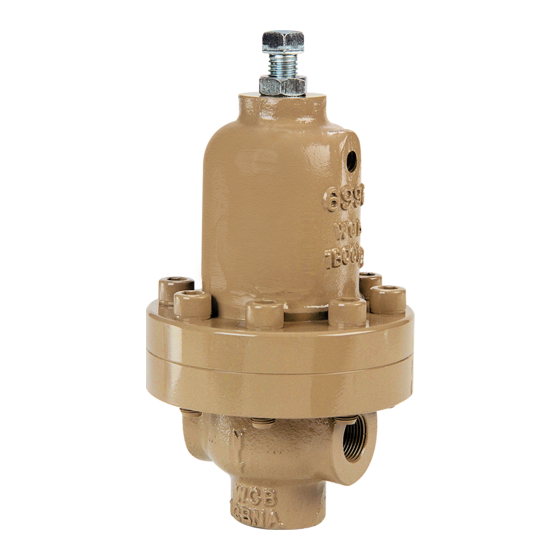cashco 6987 Instalacja, obsługa i konserwacja - Strona 8
Przeglądaj online lub pobierz pdf Instalacja, obsługa i konserwacja dla Kontroler cashco 6987. cashco 6987 9 stron. Back pressure / relief regulator

ATEX 94/9/EC:
Only for Product Codes wherein hazard
category ATEX has been selected.
These valves satisfy the safety conditions according to EN 13463-1 and EN 13463-5 for equipment group IIG 2 c.
Caution: Because the actual maximum temperature depends not on the equipment itself, but upon the fluid temperature, a
single temperature class or temperature cannot be marked by the manufacturer.
Specific Precaution to Installer: Electrical grounding of valve must occur to minimize risk of effective electrical discharges.
Specific Precaution to Installer: Atmosphere vent holes should be plugged to further minimize the risk of explosion.
Specific Precaution to Maintenance: The Valve Body/ Housing must be regularly cleaned to prevent buildup of dust deposits.
Specific Precaution to Maintenance: Conduct periodic Continuity Check between Valve Body/ Housing and Tank to minimize
risk of electrical discharges.
Attention: When repairing or altering explosion-protected equipment, national regulations must be adhered to. For maintenance
and repairs involving parts, use only manufacturer's original parts.
ATEX requires that all components and equipment be evaluated. Cashco pressure regulators are considered components.
Based on the ATEX Directive, Cashco considers the location where the pressure regulators are installed to be classified
Equipment-group II, Category 3 because flammable gases would only be present for a short period of time in the event of a leak.
It is possible that the location could be classified Equipment-group II, Category 2 if a leak is likely to occur. Please note that the
system owner, not Cashco, is responsible for determining the classification of a particular installation.
Product Assessment
Cashco performed a conformity assessment and risk analysis of its pressure regulator and control valve models and their
common options, with respect to the Essential Health and Safety Requirements in Annex II of the ATEX directive. The details
of the assessment in terms of the individual Essential Health and Safety Requirements, are listed in Table 1. Table 2 lists all of
the models and options that were evaluated and along with their evaluation.
Models and options not listed in Table 2 should be assumed to not have been evaluated and therefore should not be selected
for use in a potentially explosive environment until they have been evaluated.
Standard default options for each listed model were evaluated even if they were not explicitly listed as a separate option in the
table. Not all options listed in the tables are available to all models listed in the tables. Individual TB's must be referenced for
actual options.
When specifying a regulator that is to be used in a potentially explosive environment one must review the evaluations in Table 1
and 2 for the specific model and each and every option that is being specified, in order to determine the complete assessment
for the unit.
A summary of the models and options found to have an impact on ATEX assessment due to potential ignition sources or other
concerns from the ATEX Essential Health and Safety Requirements, are listed below.
1.
The plastic knob used as standard on some models, (P1, P2, P3, P4, P5, P7, 3381, 4381, 1171, and 2171) is a
potential ignition source due to static electricity. To demonstrate otherwise, the knob must be tested to determine
if a transferred charge is below the acceptable values in IEC 60079-0 Section 26.14 (See items 25, 27, and 28 in
Appendix A). Until the plastic knob has been shown to be acceptable, then either the metal knob option, or a preset
outlet pressure option is required to eliminate this ignition source (See items 45 and 64 in Tables).
2.
The pressure gauges offered as options on a few of the regulator models (DA's, P1-7, D, 764, 521), use a plastic
polycarbonate window that is a potential ignition source due to static electricity. To demonstrate that the gauges are
not a potential source of ignition, the gauges would need to be tested to determine if a transferred charge is below
the acceptable values in IEC 60079-0 Section 26.14 or the pressure gauge supplier must provide documentation
IOM-6987
Explosive Atmospheres and Cashco Inc. Regulators
NOTICE
8
